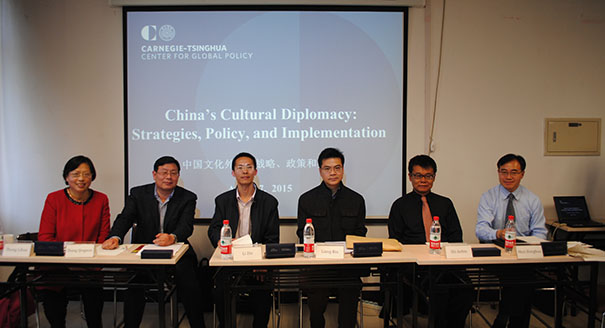Registration
You will receive an email confirming your registration.
Cultural diplomacy is a key pillar of China’s contemporary foreign policy. Soft power initiatives, like the worldwide network of Confucius Institutes, are designed to reinforce harmonious relations and enhance the international community’s knowledge of China. At the same time, Beijing’s soft power strategy has come under increasing scrutiny in recent years.
Carnegie–Tsinghua’s Zhang Lihua hosted a panel discussion with leading experts on foreign policy and intercultural communications. They reflected on both the sizeable gains and remaining challenges facing China’s public diplomacy efforts.
Discussion Highlights
- Elements of Contemporary Chinese Culture: China has undergone massive changes in the past several decades, and the country’s cultural traditions are no exception, participants noted. They asserted that traditional Confucian and Daoist values—such as the importance of social harmony and order—have blended with China’s unique vision of modernization and economic development. As China has opened up and grown more globally engaged, the country’s traditional values have come into contact with classical liberal ideas about open trade and multilateral institutionalism, which, they explained, has shaped the way China thinks about its role on the world stage.
- Cultural Diplomacy and Public Diplomacy: As China’s economic and political clout grows, so too does its need to cultivate soft power through cultural and public diplomacy, participants agreed. They described cultural diplomacy as a way to foster people-to-people ties through initiatives such as cultural festivals, art exhibitions, and language training. They contrasted this with public diplomacy, where governments use strategic communications efforts to enhance understanding of, and win support for, their foreign policy among the general public of other countries.
- A High Priority for Top Leadership: Panelists pointed out that China’s leaders have recognized the importance of soft power as the country continues to rise. In the late 2000s, the National People’s Congress and top party leadership began emphasizing cultural diplomacy as a means of promoting Chinese cultural ideas abroad and enhancing the country’s soft power. In 2013, the Communist Party’s eighteenth Central Committee declared that public diplomacy should be led by the government and run based on market principles so that these efforts remain grounded in their Chinese context while also showing appreciation for the local traditions of countries around the world.
- Multiple Channels of Soft-Power Diplomacy: China’s soft-power diplomacy efforts have grown more sophisticated and extended into a wide variety of cultural activities, panelists noted. They explained that these efforts involve promoting art exhibitions, musical performances, and large-scale events—such as the 2008 Olympics and the 2010 World Expo—all of which spread awareness of Chinese culture abroad. With nearly 500 centers in over 100 countries worldwide, China’s Confucius Institutes provide language training and educational programming for many people. Meanwhile, Chinese state media outlets are becoming more globally-minded with increased overseas reporting and programming designed for an international audience, panelists explained.
- Challenges to Enhancing Cultural Diplomacy: Panelists conceded that China’s cultural diplomacy faces ongoing challenges. These diplomatic efforts are implemented by a complex network of actors, including the Ministry of Culture, the Ministry of Education, and the Communist Party’s Publicity Department, which can make it difficult to coordinate policy. Chinese culture remains unfamiliar to many U.S. citizens, who continue to receive information about China mostly from U.S.-based media sources. Panelists concluded that further efforts are necessary to enhance mutual understanding between the two countries.
Zhang Lihua
Zhang Lihua is a resident scholar at the Carnegie–Tsinghua Center for Global Policy where she examines how China’s core values affect Chinese foreign policy.
Shi Anbin
Shi Anbin is the associate dean of journalism and communication at Tsinghua University.
Men Honghua
Men Honghua is a professor at the International Institute for Strategic Studies at the Central Party School.
Zhang Qingmin
Zhang Qingmin is a professor at Peking University’s School of International Studies and an academic committee member of the university’s International Strategic Studies Center.
Li Zhi
Li Zhi is a professor in the School of Television and Journalism at the Communication University of China.
Liang Bin
Liang Bin is the director of the Bureau of Foreign Communications at the Ministry of Culture.
